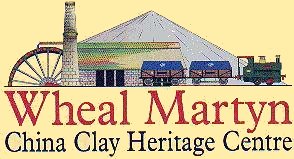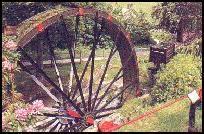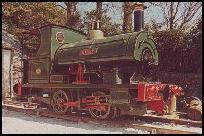
Carthew, St. Austell, PL26 8XG
Tel: (01726) 850362
Email: info@wheal-martyn.com
Web: www.wheal-martyn.com
The UK's only China Clay Museum
The museum was established in 1975 by the producers of china clay in Cornwall to preserve and record the history of the mid Cornwall area. It is situated alongside the St. Austell River in a valley which contained several china clay works. The old clay works opened as part of the museum in 1975 and became a Scheduled Ancient Monument, under English Heritage's scheme, in 1978. As well as the historic buildings the museums owns and looks after a large collection of items associated with the china clay industry.
Historic trail - discover the history of this important Cornish industry. Open air historic clay workings, indoor exhibitions, displays and audio-visual show. 1899 locomotive. Working waterwheels and 1916 Peerless lorry.
Nature trail - a mile long walk through the beautiful wooded site and spectacular views of a modem day working clay pit. Children's Adventure Trail - picnic area. Mineral display, gift and pottery shop.

Wheal Martyn unlocks the secret of Cornwall's "White Alps" and unfolds the 250 year saga behind Cornwall's biggest industry on a 26 acre site which combines real production with reconstruction.
China clay comes from decomposing feldspar in granite and is the main ingredient of porcelain - for years a Chinese secret until in 1768, a Plymouth apothecary called William Cookworthy patented his formula for a paste using Cornish deposits found near Helston. Later better deposits were found at St. Stephen near St. Austell and the 25 square mile area around this town is now the largest producer of china clay in England. Today it remains a key component of ceramics but is more widely used for paper coating and filling.
A fascinating history comes alive in Wheal Martyn's vivid audio-visual, which charts the extraordinary rise of China Stone and Clay from local building material and furnace-liner to high profile, international industry, creating world-famous tableware and producing over 3,000,000 tons annually.
Wheal Martyn Clay Works were established by Elias Martyn in the 1820's and became one of the major clay producers in Cornwall. When Elias died in 1872 some parts of the works were closed completely and other areas were leased out. It wasn't until 1880 that they were revived when John Lovering took over the lease, introducing new techniques and redeveloping the site to work at optimum levels. A slump in trade caused the closure of the pit in 1931, but the dry remained in use to work lower grade clay from other pits in the valley. By 1971 the Wheal Martyn China Clay works were once again operational, and the large quarry continues to be worked today producing about 2,000 tons of china clay a week - the same quantity that Elias Martyn managed in a year in 1869.

This background stands you in good stead for the History Trail. Prefaced by displays of tools, steam locomotives and the original oil-fired generator, it takes you stage by stage through a 19th century clay works which incorporate Cornwall's largest working water-wheel.
A second Nature Trail shows the reconciliation of industry and environment. It explores a unique range of habitats - man-made and natural - culminating in the spectacular Pit View overlooking the modern Wheal Martyn at work, employing the latest extraction methods.
Children meanwhile are well catered for. There is a play area for the little ones, and for the over 10's a challenging, commando-style Adventure Trail of their own. The Gift and Coffee Shops provide a choice of rendezvous for the family to meet for a snack or choose a souvenir of an unforgettable visit.
The Clay Trails are a new collection of multi-use trails for cycling, walking, horse-riding and wheelchair use, taking you straight to the Country Park and beyond. You can also use the trails to discover the surrounding 'clay country' with its unique industrial landscape and wonderful flora and fauna. These short, easy and mainly traffic-free signed trails connect the Country Park with Bugle, the Eden Project and St. Austell, as well as local train and bus stations. You can also travel from St. Austell and Bodmin to the China Clay Country Park, and beyond, by following National Route 3, part of the National Cycle Network.
Our licensed café serves delicious, locally sourced food including tasty breakfasts, homemade lunches and specials for all ages, as well as freshly baked cakes and yummy Cornish treats. Enjoy a well-earned cuppa, beer or glass of wine on the terrace (a fantastic little sun trap) or on a comfy sofa next to the cosy wood burner.
There is no charge to enter the café and we have free parking, so pop in, relax and unwind. Afterwards, have a wander around our lovely gift shop.
Approx two miles north of St. Austell on the B3274.
HISTORIC TRAIL * NATURE TRAIL * NEW EXHIBITIONS * AUDIO VISUAL SHOW * CHILDRENS ADVENTURE TRAIL & PLAY AREA * POTTERY * PICNIC AREAS * COFFEE SHOP * GIFT SHOP * FREE CAR PARK * DOGS WELCOME
Opening TimesDaily, 10.00am - 4.00pm, 1st April to 31st October inclusive. Admission Charged |
Charlestown The Eden Project St. Austell The Clay Trails St. Austell Town Museum Cornwall's China Clay Industry